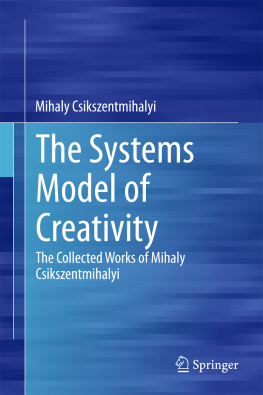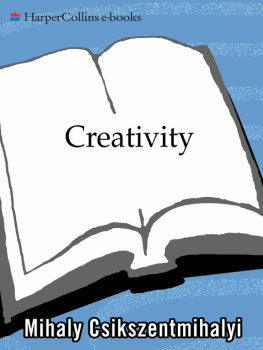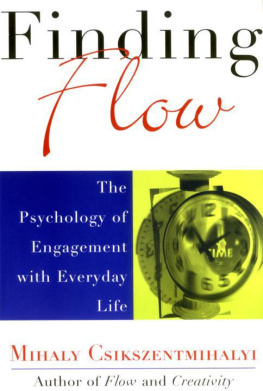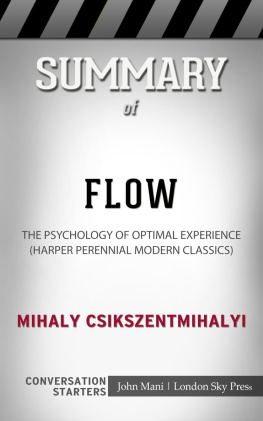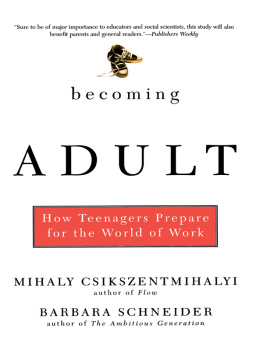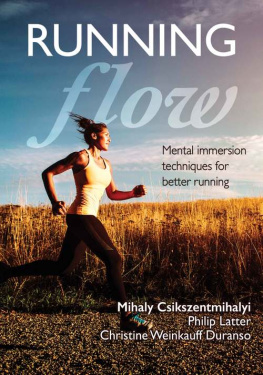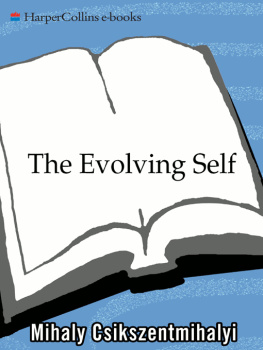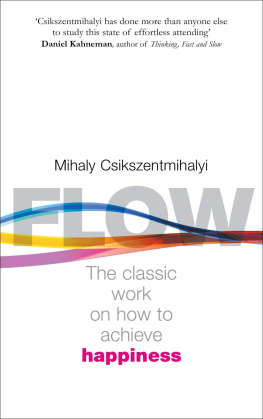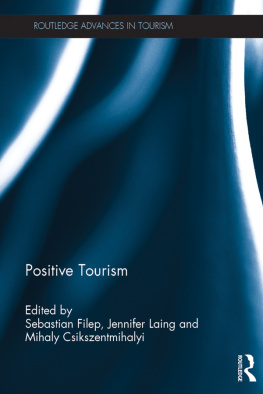Mihaly Csikszentmihalyi - The Evolving Self - Mihaly Csikszentmihalyi
Here you can read online Mihaly Csikszentmihalyi - The Evolving Self - Mihaly Csikszentmihalyi full text of the book (entire story) in english for free. Download pdf and epub, get meaning, cover and reviews about this ebook. genre: Religion. Description of the work, (preface) as well as reviews are available. Best literature library LitArk.com created for fans of good reading and offers a wide selection of genres:
Romance novel
Science fiction
Adventure
Detective
Science
History
Home and family
Prose
Art
Politics
Computer
Non-fiction
Religion
Business
Children
Humor
Choose a favorite category and find really read worthwhile books. Enjoy immersion in the world of imagination, feel the emotions of the characters or learn something new for yourself, make an fascinating discovery.

- Book:The Evolving Self - Mihaly Csikszentmihalyi
- Author:
- Genre:
- Rating:5 / 5
- Favourites:Add to favourites
- Your mark:
- 100
- 1
- 2
- 3
- 4
- 5
The Evolving Self - Mihaly Csikszentmihalyi: summary, description and annotation
We offer to read an annotation, description, summary or preface (depends on what the author of the book "The Evolving Self - Mihaly Csikszentmihalyi" wrote himself). If you haven't found the necessary information about the book — write in the comments, we will try to find it.
Mihaly Csikszentmihalyi: author's other books
Who wrote The Evolving Self - Mihaly Csikszentmihalyi? Find out the surname, the name of the author of the book and a list of all author's works by series.
The Evolving Self - Mihaly Csikszentmihalyi — read online for free the complete book (whole text) full work
Below is the text of the book, divided by pages. System saving the place of the last page read, allows you to conveniently read the book "The Evolving Self - Mihaly Csikszentmihalyi" online for free, without having to search again every time where you left off. Put a bookmark, and you can go to the page where you finished reading at any time.
Font size:
Interval:
Bookmark:
Also by Mihai.y Csikszentmihalyi
Flow: The Psychology of Optimal Experience
Beyond Boredom and Anxiety
The Creative Vision with Jacob W. Getzels
The Meaning of Things with Eugene Rochberg-Halton
Being Adolescent with Reed Larson
Television and the Quality of Life with Robert Kubey
The Art of Seeing with Rick Robinson
Optimal Experience: Studies of Flow in Consciousness with Isabella Selega Csikszentmihalyi
T HE Evolving
Self
A PSYCHOLOGY FOR THE THIRD MILLENNIUM
MIHALY CSIKSZENTMIHALYI

the evolving self. Copyright 1993 by Mihaly Csikszentmihalyi. All rights reserved. Printed in the United States of America. No part of this book may be used or reproduced in any manner whatsoever without written permission except in the case of brief quotations embodied in critical articles and reviews. For information address HarperCollins Publishers, Inc., 10 East 53rd Street, New York, NY 10022.
HarperCollins books may be purchased for educational, business, or sales promotional use. For information, please write: Special Markets Department, HarperCollins Publishers, Inc., 10 East 53rd Street, New York, NY 10022.
FIRST EDITION
Designed by Irving Perkins Associates Library of Congress Cataloging-in-Publication Data
Csikszentmihalyi, Mihaly.
The evolving self: a psychology for the third millennium / Mihaly Csikszentmihalyi. 1st ed. p. cm.
Includes bibliographical references and index.
ISBN 0-06-016677-0 1. Genetic psychology. 2. Behavior evolution. 3. Social evolution. I. Title.
BF701.C676 1993
155.7dc20 92-56220
93 94 95 96 97 CC/HC 10 987654321
Contents
4 Predators and Parasites
The Competition of Memes 120
Memes and Addiction 126
Memes and Media 131
The Competition of Ideas 136
What Transcenders Are Like 208
What Is the Self? 216
Evolving Images of the Ideal Self 219
The Development of the Self Through the Life Span 234
Flow and the Growth of the Self 237
The Skills of Spirituality and Wisdom 238
The Challenges of the Future 244
Further Thoughts on The Transcendent Self 249
Notes
References
Index
Introduction
What follows is a sequel to Flow, a book I wrote three years ago. Flow reported a quarter century of psychological research on happiness. It presented a summary of the principles that make living worthwhile. It dealt with questions such as these: Why do some people love their work, have a great time with their family, and relish the hours spent thinking in solitude while others hate their jobs, are bored at home, and dread being alone? How can the routines of everyday life be transformed so that they feel as exciting as skiing down a mountain slope, as fulfilling as singing the Hallelujah Chorus, as meaningful as taking part in a sacred ritual? The studies I and others had done suggested that such transformations were possible.
After many years of systematic research, the time came to take stock of what we had learned, and present it to a wider audience. Flow has been successful beyond expectation in reaching this aim; however, in order to complete its argument, many issues that could not be dealt with in that book still had to be explored. To do so is the aim of the present volume.
My interest in enjoyment began in 1963, when I was working on a doctoral dissertation in human development at the University of Chicago. The thesis revolved around a central issue in creativity: How do people go about thinking up new questions? How do they identify problems that no one else thought of before? To answer these questions, I resolved to observe artists at work. By taking notes and pictures of how paintings developed and then asking questions of the artists afterward as to what went on in their minds while they worked, I hoped to gain useful insights into the process of creativity.
Though my research into creativity proved successful, something even more important emerged from my observations of artists at work. What impressed me was how totally involved the artists
became with what was transpiring on canvas. An almost hypnotic trance seemed to seize them as they struggled to give shape to their vision. When a painting was beginning to get interesting they could not tear themselves away from it; they forgot hunger, social obligations, time, and fatigue so that they could keep moving it along. But this fascination lasted only as long as a picture remained unfinished; once it stopped changing and growing, the artist usually leaned it against a wall and turned his or her attention to the next blank canvas.
It seemed clear that what was so enthralling about painting was not the anticipation of a beautiful picture, but the process of painting itself. At first this seemed strange, because psychological theories usually assume that we are motivated either by the need to eliminate an unpleasant condition like hunger or fear, or by the expectation of some future reward such as money, status, or prestige. The idea that a person could work around the clock for days on end, for no better reason than to keep on working, lacked credibility. But if one stops to reflect, this behavior is not as unusual as it may seem at first. Artists are not the only ones who spend time and effort on an activity that has few rewards outside itself. In fact, everyone devotes large chunks of time doing things that are inexplicable unless we assume that the doing is enjoyed for its own sake. Children spend much of their lives playing. Adults also play games like poker or chess, participate in sports, grow gardens, learn to play the guitar, read novels, go to parties, walk through woodsand do thousands of other thingsfor no good reason except that the activities are fun.
Of course, there is always the possibility that one will also get rich or famous by doing these things. The artist may get a lucky break and sell her canvas to a museum. The guitarist may learn to play so well that someone will offer him a recording contract. We may justify doing sports to stay healthy, and go to parties because of possible business contacts or sexual adventures. External goals are often present in the background, but they are seldom the main reason why we engage in such activities. The main reason for playing the guitar is that it is enjoyable, and so is talking with people at a party. Not everyone likes to play the guitar or go to parties, but those who spend time on them usually do so because the quality of experience while involved in these activities is intrinsically rewarding. In short, some things are just fun to do.
This conclusion, however, does not get us very far. The obvious question is, Why are these things fun? Strangely enough, when we try to answer that question, it turns out that contrary to what one would have expected, the enormous variety of enjoyable activities share some common characteristics. If a tennis player is asked how it feels when a game is going well, she will describe a state of mind that is very similar to the description a chess player will give of a good tournament. So will be a description of how it feels to be absorbed in painting, or playing a difficult piece of music. Watching a good play or reading a stimulating book also seems to produce the same mental state. I called it flow, because this was a metaphor several respondents gave for how it felt when their experience was most enjoyableit was like being carried away by a current, everything moving smoothly without effort.
Contrary to expectation, flow usually happens not during relaxing moments of leisure and entertainment, but rather when we are actively involved in a difficult enterprise, in a task that stretches our physical or mental abilities. Any activity can do it. Working on a challenging job, riding the crest of a tremendous wave, and teaching ones child the letters of the alphabet are the kinds of experiences that focus our whole being in a harmonious rush of energy, and lift us out of the anxieties and boredom that characterize so much of everyday life.
Next pageFont size:
Interval:
Bookmark:
Similar books «The Evolving Self - Mihaly Csikszentmihalyi»
Look at similar books to The Evolving Self - Mihaly Csikszentmihalyi. We have selected literature similar in name and meaning in the hope of providing readers with more options to find new, interesting, not yet read works.
Discussion, reviews of the book The Evolving Self - Mihaly Csikszentmihalyi and just readers' own opinions. Leave your comments, write what you think about the work, its meaning or the main characters. Specify what exactly you liked and what you didn't like, and why you think so.

